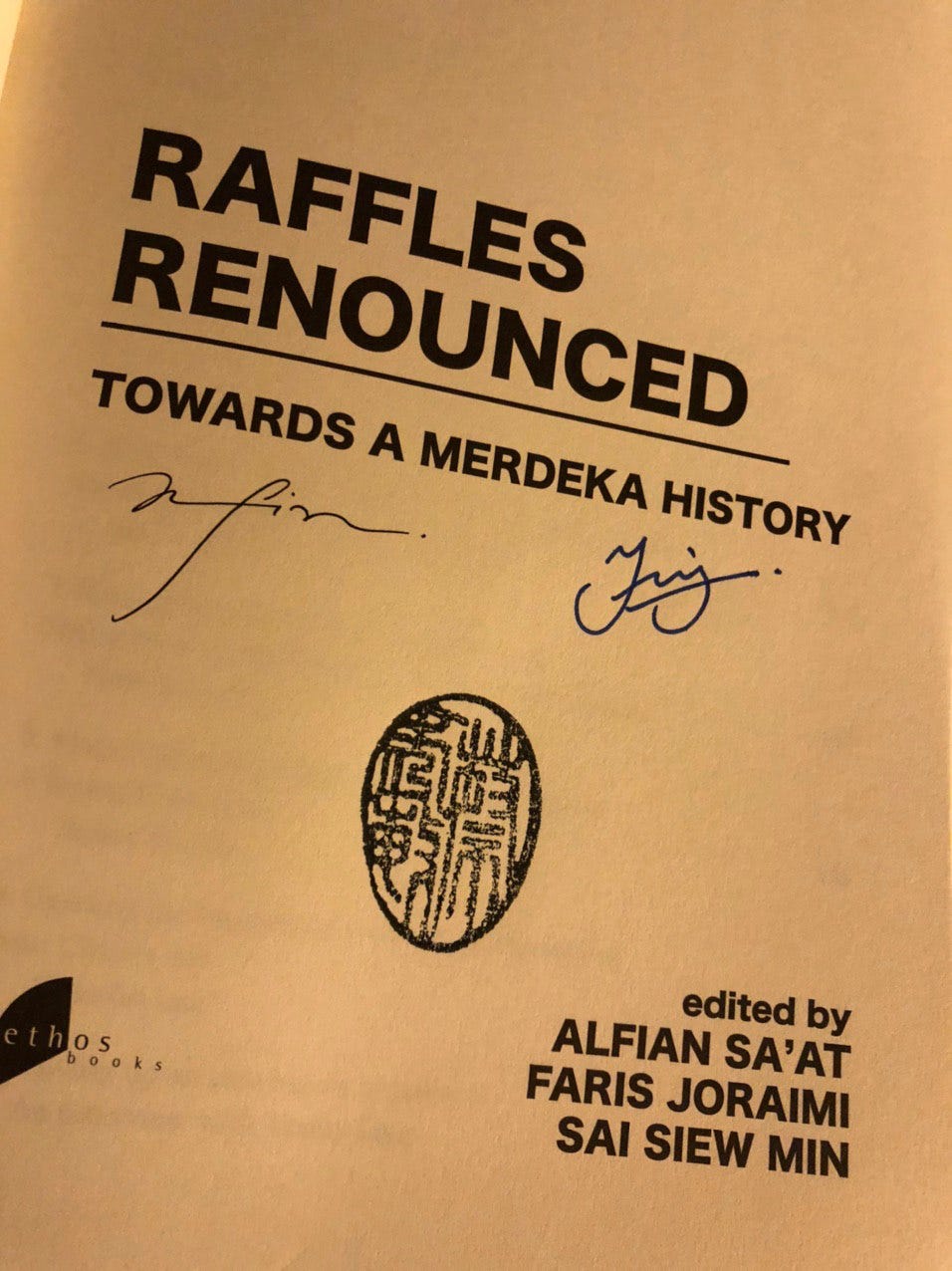Raffles Renounced
In the last edition of this newsletter, I told you all that I was going to the Raffles Renounced book launch to report on the state of literary events during the COVID-19 pandemic. I lied! My body protested so I had to stay home and watch the livestream instead. Unfortunately, the connectivity at the Substation was less than ideal so I only managed to catch unsatisfactory fragments. I stuck it out for the full hour because I was committed but I come to you today with practically nothing to report. There will be another book event happening this Saturday. It’ll be entirely online so it won’t be plagued by the same connectivity issues.
Ok, let me now talk about the book. Raffles Renounced is the latest title from Ethos Books. They are, in my opinion, the best and most interesting publishing house in Singapore at the moment. I don’t enjoy everything they put out but I do think that the Singaporean literary scene is much better because of their offerings. (They are also staffed by some of the nicest people I’ve ever had the privilege of interacting with.) The book is a collection of essays and conversations about the potential of doing decolonial history in Singapore. 2019 was the year Singapore commemorated its “Bicentennial”, i.e. 200 years since the British colonised this land. It was a fraught year in public discourse. Many progressive voices thought that the year didn’t deserve commemoration or that a commemoration without a clear indictment of colonialism was empty. Some of these arguments are captured in this volume – specifically in Huang Jianli’s great essay on the politics of commemoration but also scattered throughout the other chapters in the book.
Raffles Renounced is a fairly academic book, as far as “popular” history goes. The contributors are all either academics or artists with research-based practices, and there is little attempt to spell things out for a reader who might not already be familiar with the broad contours of the historical context. I don’t think it needs to do that either. It probably won’t surprise those of you who know me from my other work but I think publications like this are so vital in Singapore. In the lead up to and during the Bicentennial, so much digital ink was spilled on Facebook about whether or not it needed to happen, the messaging of different commemorative activities, the importance of the alternative histories that were not being foregrounded by the state. There was discourse happening in other spheres, of course. One notable example is the play Merdeka, which was co-written by Raffles Renounced co-editor Alfian Sa’at and plays a central role in the genesis of this book. However, we just can’t escape the fact that Singapore’s public square is Facebook. It’s where public intellectuals and concerned citizens are able to weigh in on current affairs without having to deal with the gatekeepers of traditional media. Even Alfian and Faris (another editor of this volume) are frequent contributors to the Facebook commons. There is a longer essay in me about the centrality of Facebook to Singapore’s intellectual discourse but here’s the short version: It’s great that it works but it shouldn’t be the only place.
Books like Raffles Renounced are exemplars of the importance of books. The essays in this collection exist in this form because the writers were given space to develop their arguments and the opportunity to interface with skilled and invested editors. So many of the essays are in conversation with each other. They reference similar sources and historical events and tread similar argumentative ground. It’s fantastic to read them together and to be reminded that history is a discipline of interpretation, not of cataloguing. I really appreciated how the editors included a selection of sources referenced at the end of the book in a section titled Merdeka Texts. It’s great to read the original texts for yourself and to gain a greater understanding of where we are in our national and regional history. Even if this book were just a collection of Alfian’s Facebook posts – something people have jokingly suggested he publish – it would be a valuable document of Singaporean political conversations. But of course, it goes much further than that and provides us with a synthesis of the essential discussions that were taking place around the Bicentennial with added scholarly rigour. I’m grateful to the editors, contributors, and publisher for making this book happen!!
Bonus Content
Faris Joraimi, Nusantaran Renaissance man and 65-year-old retiree trapped in an undergrad’s body, has a very fancy signature. All the editors have great signatures (check out Sai Siew Min’s seal) but Faris’ caught my eye because it was clearly done in fountain pen.
Because I’m a professional with my readers’ interests at heart, I managed to get intel on the specific make of fountain pen used. (I asked him.) Shop local and buy yours from Cityluxe. They have it in several colourways.
(I am new to the world of fountain pens and use this. You can always tell if I’ve been using it recently because I haven’t figured out how to hold it without smudging ink all over my index finger.)
Something I read recently
I am probably not going to finish Annie and the Wolves by Andromeda Romano-Lax. It has a decent plot: time-travelling and something about renowned sharpshooter Annie Oakley. I’m a quarter of the way through and just not hooked enough to keep going. If you like historical fiction, you might like this one. There’s just something about it that reads a little .. fan fiction-y to me. It’s not a bad thing! It’s just not for me. Admittedly, it’s been a long time since I read any fan fiction but I was always struck by how the dominant style there was overwritten. Here’s a sentence from Annie and the Wolves.
“Oh,” she said out loud, a single disappointed syllable that hung in the air like the dust motes dancing in the slanting autumn light before settling onto the scratched oak floor.
Not for me!
One non-book thing
This feature on Amazon founder Jeff Bezos.
He repels curiosity. The mind skitters off the beige gleam of his surfaces; the imagination scrabbles in vain for some purchase on the frictionless dome of his head.
It’s by Mark O’Connell, a writer whose book I’ve been meaning to pick up for ages.
If you like this newsletter, it would really make my day if you shared it with people who might enjoy it too. It’s my birthday tomorrow so I’m pulling the birthday card! I am dragging my family to Kinokuniya after dinner. I will pay for my own books but I am thrilled about not having to take the train home with a tote bag full of paperbacks. Tote bag shoulder is a real injury that plagues the 20-something I’ve-watched-several-Wong-Kar-Wai-films crowd. I’ll show you my haul in the next edition! Omg I’m a real blogger now.
You can leave a comment or you can respond directly to this email to get in touch. I reply to all of them, albeit quite slowly! It’s been very nice to hear from all of you, I am glad you are still here. 😊




